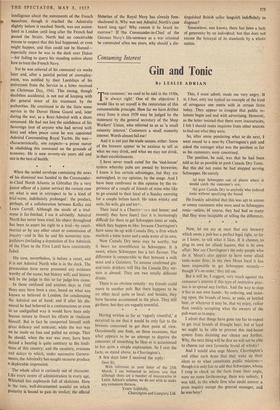Consuming Interest
Gin and Tonic
By LESLIE ADRIAN rin HE customer,' we used to be told in the 1930s, I 'is always right.' One of the objectives I would like to set myself is the restoration of this commendable principle. How far we have drifted away from it since 1939 may be judged by the statement by the general secretary of the Shop Workers' Union, who referred to us as 'a small minority interest.' Customers a small minority interest. Words almost fail me!
And it is not just the trade unions, either. Some of the brewers appear to be anxious to tell us what we may drink, and what we may not drink, in their establishments.
I have never much cared for the lied-house' system whereby pubs are owned by breweries; I know it has certain advantages, but they are outweighed, in my opinion, by the snags. And 1 have been confirmed in this opinion by the ex- perience of a couple of friends of mine who like to go around to their local of a Sunday morning for a couple before lunch. He takes whisky and soda; his wife, gin and tori•:.
Their local is a Charrin • 111 s tied house; and recently they have foun:i that it is increasingly difficult for them to get Schweppes tonic or soda, which they happen to like; because Charrington's have some tie-up with Canada Dry, a firm which markets a tonic water and a soda water of its own.
Now Canada Dry tonic may be worthy, but it bears no resemblance to Schweppes. It is sweet, where Schweppes has a tart flavour. The difference is comparable to that between a milk stout and a Guinness. To assume confirmed gin- and tonic drinkers will like the Canada Dry ver- sion is absurd. They are two totally different drinks.
There is an obvious remedy : my friends could move to another pub. But there happens to be no other local quite so local; and besides, they have become accustomed to the place. They still go there; but they are vaguely resentful.
Having written as far as 'vaguely resentful,' it occurred to me that it would be only fair to the brewers concerned to get their point of view. Occasionally one finds, on these occasions, that • what appears to be an attempt to deprive the consumer, of something he likes or is accustomed to has quite a simple explanation. So I sent the facts, as stated above, to Charrington's.
A few days later I received the reply : Dear Sir,
With reference to your letter of the 25th March, I am instructed to inform you that although there are a number of inaccuracies in Leslie Adrian's column, we do not wish to make any comments thereon.
Yours faithfully,
Charrington and Company Ltd. This, 1 must admit, made me very angry. It is, I fear, only too typical an example of the kind of arrogance one meets with in certain firms today. They appear to imagine that public re- lations begin and end with advertising. However, as the letter insisted that there were inaccuracies, I felt I should make inquiries from other sources to find out what they were.
So, after some pondering what to• do next, I went round to a near-by Charrington's pub 'and asked the manager what was the position as far as his customers were concerned.
The position, he said, was that he had been told as far as possible to push Canada Dry Tonic. But this did not mean he had stopped serving Schweppes. He merely (a) kept Schweppes out of places where it would catch the customer's eye;
(b) gave Canada Dry to anybody who ordered tonic without specifying the brand.
He frankly admitted that this was apt to amuse or annoy customers who were used to Schweppes tonic—unless, of course, they had had so many thal they were incapable of telling the difference.
Now, let me say at once that any brewery which owns a pub has a perfect legal right, so far • as I know, to sell what it likes. if it chooses to plug its own (or allied) liquors, that is its own affair. Nor are Charrington's the only people who do it. Meux's also appear to have some allied tonic-water firm; in my own Meux local it has been impossible to get Schweppes recently— though Vs on order,' they tell me.
But it will be, I suggest, very much against the consumer's interest if this type of restrictive prac- tice is to spread any further. And the way to stop it lies in our own hands : by ordering, and insist- ing upon, the brands of tonic, or soda, or bottled beer, or whatever it may be, that we enjoy, rather than meekly accepting what the owners of the pub want us to enjoy.
I admit that things have gone too far to expect to get rival brands of draught beer; but at least we ought to be able to prevent this tied-house system from dictating our choice any further. Why, the next thing will be that we will not be able to choose our own favourite brand of whisky !
And I would also urge Messrs. Charrington's and other such firms that they wake up their ideas as to what constitutes public relations— though it is only fair to add that Schweppes, whom I rang to check on the facts from their angle, were no more forthcoming; there was nobody, I was told, in the whole firm who could answer a press inquiry except the general manager, and he was busy !










































 Previous page
Previous page